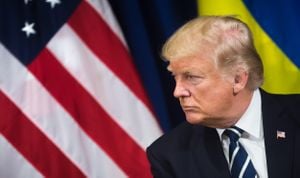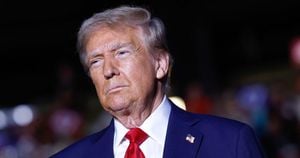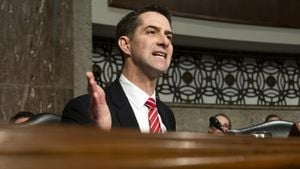Donald Trump, the President-elect, is at the center of new discussions about his intentions for immigration policy as he prepares for his next term. Trump's rhetoric around mass deportations has reignited debates over his immigration strategies, something he heavily campaigned on during the recent election. He promised to leverage military resources to enact mass deportations of illegal immigrants, stating, "We will conduct mass deportations the likes of which this country has not seen before," raising concerns and significant opposition from various liberal figures and organizations.
Trump's plans are predicated on polling data showing strong support among voters, even among demographics traditionally opposed to such measures. For example, recent surveys indicated 62% of Americans favor enhanced deportation efforts, with 53% of Hispanic voters now expressing support for his approach to immigration. This presents a shift from previous attitudes observed during his presidency, showcasing his appeal among these voters and the potential for increased tensions with the left.
The former president's actions since his electoral victory have drawn concern from commentators who interpret his statements and intentions as attempts to consolidate authoritarian power. Many critics are wary of the ramifications of using the military for domestic law enforcement, particularly against undocumented migrants. There are fears about what such actions would entail, especially when combined with calls for media censorship and measures against public dissent.
MSNBC's Rachel Maddow recently criticized Trump's rhetoric, pointing out the contradictions and dangers of his demands. She noted, “You’re not president now, my guy, and Republicans don’t control the Senate right now,” emphasizing Trump's attempts to hinder the opposition's judicial appointments even before he assumes office. Her take reflects broader concerns about the erosion of democratic norms under Trump's presidency, especially when coupled with his proposed crackdown on press freedoms.
At the same time, notable figures on the left continue to warn of the potential normalization of Trump's extreme rhetoric and policies. For example, Congresswoman Alexandria Ocasio-Cortez has described the political climate after Trump’s win as leading to “fascism and authoritarianism,” urging vigilance among the electorate and continued resistance to Trump’s agenda.
Trump’s supporters, conversely, believe his hardline immigration strategy is not only justified but necessary for national security. They argue both historical precedent and current trends show the direct relationship between illegal immigration and crime rates, asserting it compromises the safety and economic stability of American citizens. This sentiment is shared by many among his base who feel increasingly alarmed about immigration issues.
The uproar caused by Trump’s comments on deportations aligns with his characteristic approach of using incendiary language to rally support. By painting immigration through the lens of national threat, he manipulates public anxiety to justify controversial policies. This aligns with autocrats globally who have employed similar strategies to stifle dissent and control narratives. Critics often cite Hungary’s Viktor Orban as someone whose tactics of eliminating press freedom and scapegoatting minorities resonate alarmingly with Trump's actions.
Trump has also been vocal about his disdain for the media. His criticisms of mainstream outlets, calling them "fake news," serve to undermine trust and create division. The suggestion of silencing dissent not only threatens journalistic integrity but raises alarms about the future of free speech under his administration. He has hinted at reopening discussions about media networks’ licenses, contemplating serious repercussions for those who criticize him, which reflects authoritarian tendencies mirrored among authoritarian regimes worldwide.
Trump’s administration proposes fundamental shifts not only within immigration policy but also with respect to how laws are enforced and who they protect. He has claimed, "If you're illegal, you're going out," signaling a zero-tolerance approach likely to provoke civil and legal resistance. Many mayors and local officials have already promised to defy potential deportation efforts, underscoring deep divides between federal directives and local governance.
With the rhetoric surfacing around this heated topic, organizations advocating for immigrant rights plan to intensify their efforts. Their goal is to mobilize communities against potential harmful policies and pressure lawmakers to take action protecting undocumented residents. Advocacy groups argue the focus should not only be on deportation but also on comprehensive immigration reform, which appears to be off the table with the incoming administration.
The question remains: how will the public respond to these revived policies under Trump’s leadership? Will the American electorate rally behind his aggressive actions, or will there be significant pushback against what many see as authoritarian methods? Such questions loom over the political horizon as Trump prepares for the extensive challenges leading up to his candidate selection and potential administration policies.
The future under Trump might be marked by increased polarization as Democrats and Republicans mobilize their bases around deeply entrenched beliefs about immigration and governance. For many, the anxiety surrounding Trump’s actions points to broader fears about identity and security, bringing Americans’ historical anxiety about immigration to the forefront of the national discourse.
One thing is clear—the conversation around Trump’s immigration policies will dominate news cycles and political discussions for the foreseeable future as the American public navigates through these contentious debates over rights, freedoms, and national identity. The outcomes of these discussions may redefine American politics, pushing the boundaries of policy and public sentiment toward uncharted territory.



